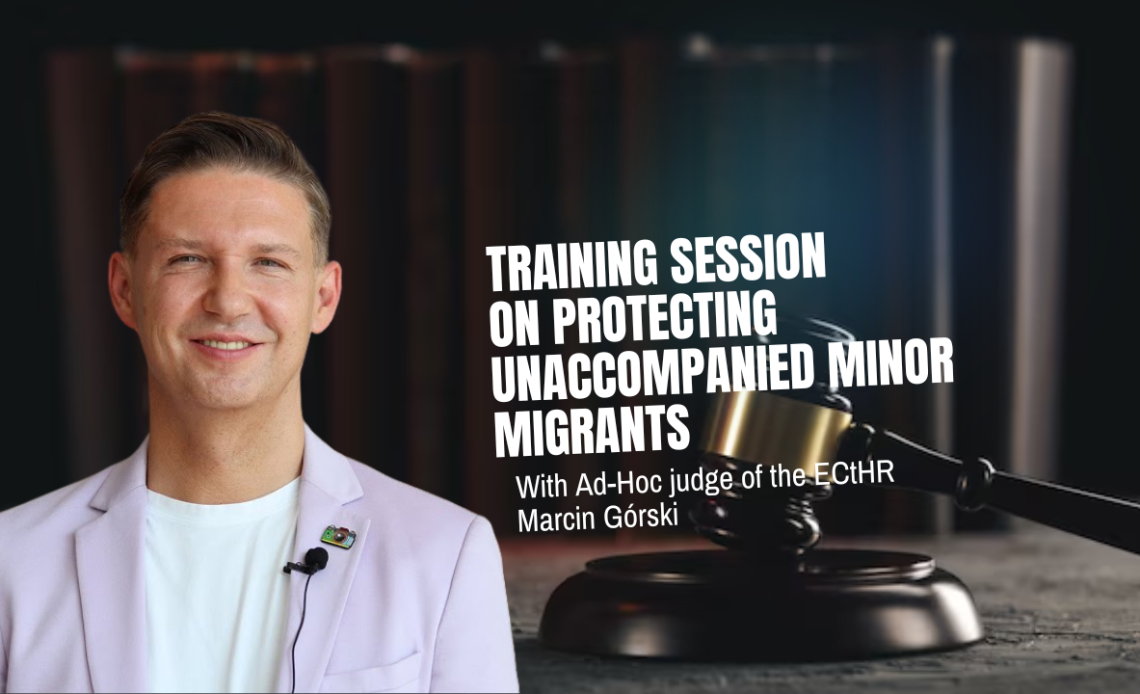ASSEDEL had the honour of hosting an in-depth training session led by Marcin Górski, Polish judge and expert in EU and human rights law. The session explored the evolving legal landscape surrounding unaccompanied minor migrants (UAMs) and provided valuable insights into the interaction between EU law, the European Convention on Human Rights (ECHR), and national legal systems.
Unaccompanied minors remain among the most vulnerable individuals arriving in Europe. Their protection requires the coordinated application of the EU Charter of Fundamental Rights, EU primary and secondary legislation, and the ECHR as interpreted by the European Court of Human Rights (ECtHR).
EU Legal Foundations: Protecting the Most Vulnerable
The European Union is built on core values enshrined in Article 2 TEU, including human dignity, equality, the rule of law, and respect for human rights. These fundamental values guide Member States in ensuring the protection of migrant children.
Under Article 6 TEU, the EU Charter of Fundamental Rights holds the same legal value as the Treaties. Its provisions reflect rights already rooted in the ECHR and in common constitutional traditions of Member States. Importantly, the Charter applies whenever Member States implement or apply EU law, as clarified by the Akerberg Fransson judgment.
This broad applicability is especially relevant in areas such as asylum procedures, migration management, criminal responsibility linked to migration, and administrative processes affecting vulnerable groups.
Rights of the Child in EU Law
Article 24 of the EU Charter sets out clear guarantees for children:
- the right to protection and care necessary for their well-being
- the requirement that the best interests of the child be a primary consideration
- the child’s right to express their views in matters affecting them
Originating from the UN Convention on the Rights of the Child—first proposed as a Polish initiative—these principles now form the backbone of EU migration and asylum procedures involving minors.
Article 52 of the Charter further ensures that EU law cannot provide weaker protection than the ECHR:
“We can be better, but we cannot be worse.”
Unaccompanied Minors and International Protection
International protection includes both refugee status and subsidiary protection under EU law.
The Qualification Directive and the new Qualification Regulation define an unaccompanied minor as a child arriving without a responsible adult, including those who become unaccompanied after arrival.
The C-646/21 K & L v Netherlands case exemplifies how EU law responds to evolving identities. Two minor girls who had embraced European values—such as gender equality and personal autonomy—feared persecution in their home country. The Court held that women (including minors) committed to equality may form a particular social group for the purposes of international protection. Their best interests must be individually and thoroughly assessed.
ECHR Standards: A Living Instrument
The ECHR, described in Tyrer v UK as a “living instrument”, adapts to contemporary societal changes. The ECtHR interprets the Convention dynamically, often guided by European consensus or the need to enhance protection of vulnerable groups.
In the context of unaccompanied minors, several articles are central:
- Article 3 – Prohibition of inhuman or degrading treatment
- Article 5 – Right to liberty
- Article 8 – Respect for private and family life
- Protocol No. 4, Article 4 – Prohibition of collective expulsion
The ECtHR’s case law emphasises that the State holds heightened obligations towards children, particularly regarding detention, reception conditions, procedural guarantees, and return procedures.
Key Case Law on Unaccompanied Minors
Musthadhiyev v Belgium
A mother and four children detained in poor conditions suffered psychological harm and inadequate care.
The Court found violations of Articles 3 and 5, stressing that children require child-appropriate conditions and that detention must remain exceptional.
Darboe and Camara v Italy (2022)
An applicant treated as an adult despite declaring he was 17 faced degrading conditions and no effective procedural safeguards.
The ECtHR found violations of Articles 3, 8, and 13, underlining the presumption of minority and the need for timely guardianship and proper age assessments.
Mubilanzila Mayeka & Mitunga and related cases
These judgments confirm that even without physical abuse, inadequate living conditions for minors can breach Article 3.
Key Takeaways
Unaccompanied minor migrants are entitled to a heightened level of protection under both EU law and the European Convention on Human Rights. All decisions concerning them must be guided by a thorough, individualized assessment of the child’s best interests, supported by clear reasoning. Detention of minors must remain a measure of last resort, strictly limited in time and carried out only in conditions that meet their specific needs as children. Age assessment procedures must respect procedural safeguards, ensure transparency, and uphold the dignity of the child at every stage. Finally, any decision regarding return or expulsion must take into account the child’s identity, vulnerabilities, cultural and social connections, and any potential risks they may face upon return, ensuring full compliance with international protection obligations.
Acknowledgment
ASSEDEL extends its sincere thanks to Marcin Górski for leading this insightful and deeply educational session. His expertise on EU and human rights law, combined with his practical understanding of the challenges faced by unaccompanied minor migrants, offered invaluable guidance to all participants.
We remain committed to promoting legal standards that safeguard the dignity, rights, and future of every child seeking protection in Europe.

